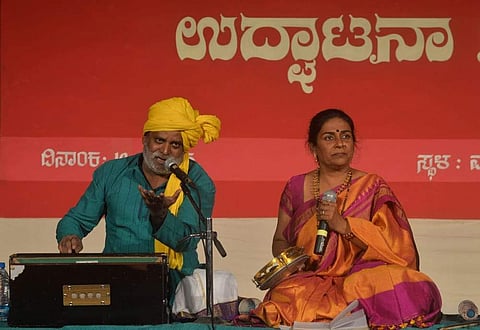

When we speak about folk songs or Janapada songs in Karnataka, the one name that springs to mind is Basavalingaiah Hiremath. Known for his work with this art form for more than 30 years, he has travelled the length and breadth of India teaching plays and Janapada songs to many youngsters. In the 1980s, they have inspired and brought many women to the stage and perform various roles in famous plays like Ali Baba and the Forty Thieves and Macbeth written by William Shakespeare, Sudharama written by B V Karanth, Dharmapuriya Shwetavratta, Shri Krishna Parijata, Siri Sampige, Raktha Ratri, Sakshi, Panjarashale, Gode, Kindarajogi and hundreds of other famous plays. Over the past three decades, he and his wife have established the Folk Research Centre in Dharwad to preserve and propagate the gradually receding art of Janapada.
We spoke to Basavalingaiah to understand why he does what he does. Excerpts:
How old were you when you started singing folk songs and who inspired you to take up Janapada?
I come from a family of artists who are originally from Bylur in North Karnataka's Kittur district. Both my parents were folk artists and they would not only sing Janapada songs but also perform Bayalaata, which are basically all forms of open-air theatre performances, including Yakshagana. We tell stories from the Indian epics and the puranas. Watching them sing and play music every day, I also started playing leg harmonium when I was only five. I performed on stage during my school and college days, but I didn't know which course had to be pursued if I had to continue in folk arts. Hence, I ended up pursuing a Bachelors in Commerce degree from Karnatak College in Dharwad. Later, I found out and pursued an MA in Folklore from Karnatak University. During all these phases of education, I travelled from one place to another and performed several plays including Desaiyara Haavali Shettara Dewali.
What was your time at the Ninasam Drama School like?
I believe that artists must not restrict themselves to one city or state. One must try to explore in terms of knowledge and skills by going beyond borders. Therefore, in 1986, I moved to Ninasam Drama School in Heggodu in Shivamogga to work with film directors like B V Karanth, K V Subbanna and others. By working with them in various plays, I improved my skills in acting and also worked as a music director for more than a year. I toured Karnataka with the Ninasam team to teach acting, Janapada songs and bring more people to act in theatre. We held a total of 400 workshops across the state and that's when I met my wife Vishweshwari Hiremath, who also graduated from Ninasam.
After we got married, a lot of drama schools in Karnataka invited us to be part of their organisation and direct plays for them. But we felt that we would be able to give more if we worked independently and bring many youngsters to the stage. Drama became a mode to spread the knowledge of Janapada songs to our youngsters across India and sometimes even in countries like America and London.
Are there different genres in Janapada songs?
There are mainly three genres. There are traditional songs, which are usually sung during festivals, when you put children to sleep, harvest season or during the demise of our close ones. Then, we have songs that we sing while performing on stage. The third category includes Janapada songs that have Vachanas written by social reformers, poems written by Kanaka Das and Purandara Das and many others.
What led you to start the Folk Research Centre in Dharwad?
In 1995, Ramkrishna Hegde, Former Chief Minister, J H Patel and M P Prakash approached me and asked me if I can start a research centre for future generations' sake. That's how the Folk Research Centre in Dharwad came into existence in 1995. From then onwards, my work in spreading the knowledge of folk songs and art became formal.
So what exactly do you do through the Folk Research Centre?
It is the epicentre of folk art in Dharwad. A lot of post-graduate students and PhD students researching this subject come to the centre to access both written and audio sources of information. On my 50th birthday, MM Kalburgi, a famous scholar from Dharwad told me to record all the Janapada songs I knew to preserve them for future generations. Hence, I recorded over two thousand songs and provided them to all the universities across the state so that it serves as a source for students studying music and folk art. Besides this, we have been conducting classes and weekend workshops for school students to teach them Janapada songs. We also conduct workshops for school teachers to train them on how art and education can go hand in hand. If children are taught one Janapada song in each Kannada class, then they will never forget it and carry it forward for many generations. We also teach students art forms like Dollu Kunita, Veeragase. Kunitha which are forms of folk dance.
What are your future plans for the Folk Research Centre?
My wife and I will continue to work to spread awareness among youngsters on folk art. For the past one year, we have been conducting these workshops online mode. From the time I was five to the time I turned 60, I have sung around 4,000 Janapada songs without a script or a sheet. If not all 4,000 songs, I hope children in the future will remember a few Janapada songs in the age of technology and social media.
